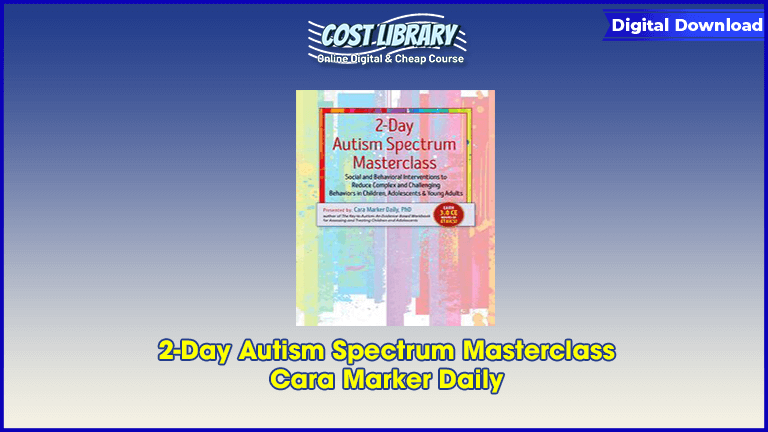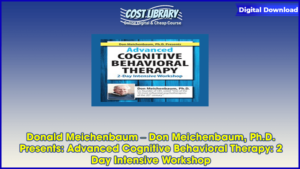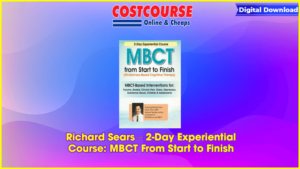2-Day Autism Spectrum Masterclass: Social and Behavioral Interventions to Reduce Complex and Challenging Behaviors in Children, Adolescents & Young Adults – Cara Marker Daily
Faculty:
Cara Marker Daily
Duration:
12 Hours 32 Minutes
Format:
Audio and Video
Copyright:
Nov 14, 2019
Description
Transform your autism intervention with this 2-day Autism Spectrum Masterclass recording!
Begin by joining autism expert and author, Cara Daily, PhD, BCBA, and learn the most effective evidence-based social and behavioral interventions for working with the pervasive comorbid disorders and symptoms associated with ASD.
Dr. Daily makes this complex disorder easy to understand—you will leave with the interventions and skills required to confidently teach children, adolescents and young adults with autism how to live more independent and fuller lives!
Learn how to integrate the latest research on brain development, visual and environmental modifications, cognitive-behavioral interventions and successful psychosocial techniques to help clients manage challenging behaviors related to ASD.
Through engaging case studies, demonstrations, and hands-on activities you will learn the skills necessary to:
Manage emotional and physical reactions to anxiety and OCD
Turn maladaptive behaviors around and reduce meltdowns
Improve attention, motivation and organizational skills
Decode ADHD and Executive Functioning in ASD
Decipher symptoms of OCD vs. ASD
Reduce depressive symptoms and suicidal ideation
Strengthen the skills needed to make/keep friends
Address body and sexual awareness, exploration of self, sexual arousal
Recognize what trauma looks like with ASD
Expose clients to more appropriate self-stimulatory behaviors
Accurately interpret assessment reports to guide effective interventions
Use classroom modifications for preferential seating, successful transitions and alternate task-taking
Learn the essential autism treatment tools that are easy to implement in the clinic, at school and home!
Handouts
Manual – Autism Spectrum Masterclass (4.97 MB) 106 Pages Available after Purchase Instructions for ASHA Credit – SELF STUDY ONLY – 11/14&15/19 (38.5 KB) Available after Purchase
Outline
Neuropsychology: How the Brain with Autism Works
Latest research in ASD brain development
Comorbid disorders and symptoms
Enhanced vs. impaired abilities
Information processing: Typical brain vs. brain with autism
How an individual with ASD processes tasks
Assessments: From Observational to Standardized Tools
Comprehensive diagnostic tools and evaluations
Screeners for anxiety, depression, OCD
Career planning assessments
Modified checklists for infants and toddlers
Accurately interpret reports to guide interventions
Ethical challenges in assessment and communication of diagnosis
TAKE YOUR AUTISM INTERVENTION TO THE NEXT LEVEL!
Effectively Intervene Early
Applied Behavioral Analysis to break down targeted skills
Developmental interventions to express feelings and form relationships
Educational interventions for parents
Ethical principles to educate and support families in treatment choices
Case study: 2-year-old boy, working on verbal requests
Strengthen Communication and Social Interaction Skills
Visual systems to improve communication and reduce meltdowns
Teach turn-taking and pragmatic language
Programs to assist in generalizing social skills
Video modeling and role play to teach social rules
Social stories and social autopsies
Special interests to change unwanted or inappropriate behavior
Case study: 8-year-old male, competitive, difficulty losing at games, aggressive with peers
Manage Sensory Overload and Self-Stimulatory Behaviors
Exposure to more appropriate self-stimulatory behaviors
Fading out severe self-stimulatory behaviors
Environmental strategies including classroom modifications
Case study: 6-year-old female, hand flapping, rocking, and high-pitch squealing sounds
Decode ADHD and Executive Functioning in ASD
Improve attention, on-task and organizational skills
Schedules, timelines, web diagramming
How to provide more preferred tasks vs. less preferred tasks
“Home base†to help organize in classroom
Case study: 11-year-old male, difficulty planning/ organizing, needs help with social pragmatic language skills
Decrease Undesirable Physical, Verbal and Other Inappropriate Behaviors
Turn noncompliance and oppositional behavior around
Applied behavioral analysis techniques
Token economy systems
Functional behavioral assessment made easy
Case study: 10-year old male, impulsive, engages in stealing behaviors
Manage Anxiety and Specific Phobias
Cognitive Behavioral and Coping Cat Training
Recognize emotional and physical reactions to anxiety
Clarifying thoughts and feelings in anxious situations
Develop plans for effective coping
Evaluate performance and giving self-reinforcement
Case study: 9-year old male, generalized anxiety disorder, and school phobia
Decrease Obsessive-Compulsive Behaviors
Decipher symptoms of OCD vs ASD
CBT and Exposure and Response Prevention
Mapping OCD
Creating the exposure hierarchy
Relapse prevention and family sessions
Case study: 22-year old female, excessive hand washing with fear of illness
Reduce Depressive Symptoms and Suicidal Ideation
Psychosocial interventions: Experiential activities with practice time
Cognitive-behavioral therapies
Mindfulness-based therapies
Family therapies
Social and vocational programs
Case study: 15-year-old male, hates school and has a plan, intent, and timeline for suicide
Sexuality and Sexual Behavior Challenges
Body awareness and exploration of self
Sexual arousal, puberty and sex education
Address dating and sexual relationships
Education on masturbation and pornography
Gender Identity and LGBTQ
Case study: 14-year-old male, frequent masturbation and stalking behaviors
Psychopharmacological Interventions
Commonly prescribed medications
Medication efficacy
Risks vs. benefits
Case study: 17-year-old male, flat affect, on medication for ADHD and anxiety
Special Considerations
Trauma: Similarities and differences with ASD
Independent living and career planning
Guardianship and legal Issues
Multicultural and gender differences
Limitations of research and potential risks
Case study: 5-year-old male, adopted overseas with no birth or developmental history
Case Study: 19-year-old female, living at home with mom, no job, and never diagnosed with ASD
Ethical Challenges in Autism
Guidelines for assessment, treatment, and consultation
Welfare of the individual Informed consent
Use of restraints
Time-out vs. seclusion
Case study: 8-year-old-male, screaming, standing on top of table with scissors in his hand
Faculty
Cara Marker Daily, PhD, BCBA
Licensed Pediatric Psychologist
Daily Behavioral Health
Cara Marker Daily, PhD, BCBA, is a licensed psychologist and a Board Certified Behavior Analyst with over 20 years of experience providing assessment and treatment for children, adolescents and young adults with autism in the home, school, hospital and community settings. She works directly with educators, speech/language pathologists, occupational therapists, BCBAs and other professionals. Dr. Daily is the president and training director of Daily Behavioral Health, a leading behavioral health provider in northeast Ohio specializing in assessment, consultation, and treatment of autism, anxiety and disruptive behavior disorders. She is the founder and executive director of the Building Behaviors Autism Center, which has received numerous grants to provide free and reduced cost applied behavioral analysis services to individuals with autism.
Dr. Daily has written several cognitive-behavioral and behavioral-based curriculums focusing on teaching daily living skills to children with autism and published a peer-reviewed journal article supporting evidence for success of these programs. She has presented nationally on topics of autism, disruptive behaviors disorders, anxiety and chronic health conditions in the pediatric population. Dr. Daily has been featured in radio, television, and other media platforms in northeast Ohio. She is the author of The Key to Autism: An Evidence-Based Workbook for Assessing and Treating Children & Adolescents (PESI, 2016).
Dr. Daily received her Ph.D. in School Psychology at the University of South Carolina, and completed an internship in Pediatric Psychology at the Children’s Hospital of Philadelphia and a postdoctoral fellowship in Pediatric Psychology at The Children’s Hospital at The Cleveland Clinic. Dr. Daily is a member of the Department of Pediatrics at Fairview Hospital at the Cleveland Clinic, the American Psychological Association, the Ohio Psychological Association, and the Christian Association of Psychological Studies.
Speaker Disclosures:
Financial: Cara Marker Daily is the president/training director for Daily Behavioral Health, Inc. She is the founder/executive director of the Building Behaviors Autism Center. She is a compensated consultant for Rethink Autism. She receives a speaking honorarium from PESI, Inc.
Nonfinancial: Cara Marker Daily has no relevant non-financial relationship to disclose.








